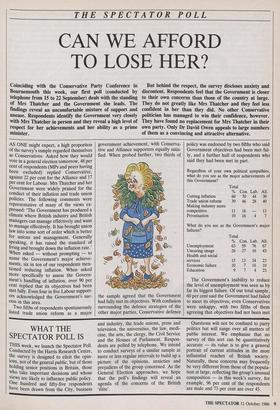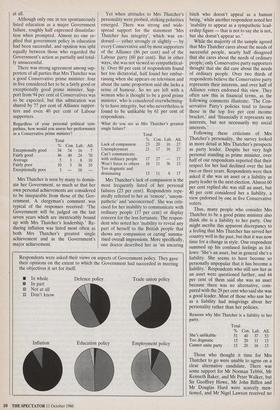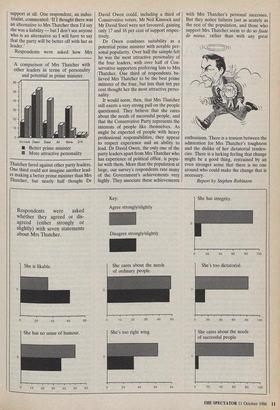THE SPECTATOR POLL
CAN WE AFFORD TO LOSE HER?
Coinciding with the Conservative Party Conference in Bournemouth this week, our first poll (conducted by telephone from 15 to 22 September) deals with the standing of Mrs Thatcher and the Government she leads. The findings reveal an uncomfortable mixture of support and unease. Respondents identify the Government very closely with Mrs Thatcher in person and they reveal a high level of respect for her achievements and her ability as a prime minister. But behind the respect, the survey discloses anxiety and discontent. Respondents feel that the Government is closer to their own concerns than those of the country at large. They do not greatly like Mrs Thatcher and they feel less confident in her than they did. No other Conservative politician has managed to win their confidence, however. They have found no replacement for Mrs Thatcher in their own party. Only Dr David Owen appeals to large numbers of them as a convincing and attractive alternative.
AS ONE might expect, a high proportion of the survey's sample regarded themselves as Conservatives. Asked how they would vote in a general election tomorrow, 48 per cent of respondents (MPs and peers having been excluded) replied Conservative, against 22 per cent for the Alliance and 17 per cent for Labour. Mrs Thatcher and her Government were widely praised for the conduct of their inflation and trade union policies. The following comments were representative of many of the views ex- pressed: 'The Government has produced a climate where British industry and British managers can manage effectively and want to manage effectively. It has brought union law into some sort of order which is better for unions and management. Generally speaking, it has raised the standard of living and brought down the inflation rate.' When asked — without prompting — to name the Government's major achieve- ments, six in ten of our respondents men- tioned reducing inflation. When asked more specifically to assess the Govern- ment's handling of inflation, over 90 per cent replied that its objectives had been met fully. Even four in five Labour support- ers acknowledged the Government's suc- cess in this area.
Two fifths of respondents spontaneously listed trade union reform as a major government achievement, with Conserva- tive and Alliance supporters equally satis- fied. When probed further, two thirds of the sample agreed that the Government had fully met its objectives. With confusion surrounding the defence strategies of the other major parties, Conservative defence policy was endorsed by two fifths who said Government objectives had been met ful- ly, and a further half of respondents who said they had been met in part.
Regardless of your own political sympathies, what do you see as the major achievements of this Government?
Total
% Con. Lab. All.
Cutting inflation 60 70 44 30 Trade union reform 39 46 28 40 Making industry more competitive 11 16
13 Privatisation 10 16 4 7 What do you see as the Government's major failures?
Total
% Con. Lab. All.
Unemployment 63 59 76 67 Uncaring image 26 27 16 43 Health and social services 15 13 24 23 Economic failure 10 7 16 10 Education 9 7 4 23 The Government's inability to reduce the level of unemployment was seen as by far its biggest failure. Of our total sample, 60 per cent said the Government had failed to meet its objectives; even Conservatives were unhappy, with two fifths of them agreeing that objectives had not been met at all.
Although only one in ten spontaneously listed education as a major Government failure, roughly half expressed dissatisfac- tion when prompted. Almost no one re- plied that government policy in education had been successful, and opinion was split equally between those who regarded the Government's action as partially and total- ly unsuccessful.
There was strong agreement among sup- porters of all parties that Mrs Thatcher was a good Conservative prime minister: four in five considered her to be a fairly good or exceptionally good prime minister. Sup- port from 94 per cent of Conservatives was to be expected, but this admiration was shared by 77 per cent of Alliance suppor- ters and even 40 per cent of Labour supporters.
Regardless of your personal political sym- pathies, how would you assess her performance as a Conservative prime minister?
Total
% Con. Lab. All.
Exceptionally good 34 54 16 7 Fairly good 46 40 24 70 Average 5 3 8 10 Fairly poor 10 3 36 10 Exceptionally poor 3 -- 16
- Mrs Thatcher is seen by many to domin- ate her Government, so much so that her own personal achievements are considered to be inseparable from those of the Gov- ernment. A clergyman's comment was typical of the responses received: 'The Government will be, judged on the last seven years which are inextricably bound up with Mrs Thatcher's leadership.' Re- ducing inflation was listed most often as both Mrs Thatcher's greatest single achievement and as the Government's major achievement. Yet when attitudes to Mrs Thatcher's personality were probed, striking polarities emerged. There was strong and wide- spread support for the statement 'Mrs Thatcher has integrity', which was en- dorsed — either strongly or slightly — by every Conservative and by most supporters of the Alliance (86 per cent) and of the Labour party (60 per cent). But in other ways, she was not viewed so sympathetical- ly. Over 80 per cent of respondents found her too dictatorial, half found her embar- rassing when she appears on television and about the same proportion said she lacks a sense of humour. So we are left with a woman who is thought to be a good prime minister, who is considered overwhelming- ly to have integrity, but who nevertheless is found to be unlikable by 61 per cent of respondents.
What do you see as Mrs Thatcher's greatest single failure?
Total
% Con. Lab. All.
Lack of compassion 23 20 16 27 Unemployment 21 17 16 27 Can't communicate with ordinary people 17 27 — 17 Won't listen to others 16 11 36 13 Too dogmatic and dominating 13 11 8 17
Mrs Thatcher's lack of compassion is the most frequently listed of her personal failures (23 per cent). Respondents repe- atedly referred to her as 'remote', 'unsym- pathetic' and 'unconcerned'. She was criti- cised for her inability to communicate with ordinary people (17 per cent) or display concern for the less fortunate. The respon- dent who noted her 'inability to reveal any part of herself to the British people that shows any compassion or caring' summa- rised overall impressions. More specifically, one doctor described her as 'an uncaring Respondents were asked their views on aspects of Government policy. They gave their opinions on the extent to which the Government had succeeded in meeting the objectives it set for itself.
■ In whole RI In part
O Not at all • Don't know
Inflation Defence policy Education policy Trade union policy Employment policy bitch who doesn't appeal as a human being,' while another respondent noted her `inability to appear as a sympathetic lead- ership figure — that is not to say she is not, but she doesn't appear so.'
While the majority of the sample agreed that Mrs Thatcher cares about the needs of successful people, nearly half disagreed that she cares about the needs of ordinary people; only Conservative party supporters thought that she did care about the needs of ordinary people. Over two thirds of respondents believe the Conservative party represents their interests, and over half of Alliance voters endorsed this view. They often saw this in financial terms, as the following comments illustrate: 'The Con- servative Party's policies tend to favour those in the top five per cent income bracket,' and 'financially it represents my interests, but not necessarily my social interests.'
Following these criticisms of Mrs Thatcher's personality, the survey looked in more detail at Mrs Thatcher's prospects as party leader. Despite her very high personal standing as prime minister, over half of our respondents reported that their respect for her had declined over the last two or three years. Respondents were then asked if she was an asset or a liability as party leader in the next election. Almost 60 per cent replied she was still an asset, but 40 per cent considered her a liability, a view endorsed by one in five Conservative voters.
Thus, many people who consider Mrs Thatcher to be a good prime minister also think she is a liability to her party. One might ascribe this apparent discrepancy to a feeling that Mrs Thatcher has served her country well in the past, but that it was now time for a change in style. One respondent summed up his confused feelings as fol- lows: 'She's an asset, but in general she's a liability. She seems to have become so personally unpopular that it has become a liability.' Respondents who still saw her as an asset were questioned further, and 44 per cent of them said she was an asset because there was no alternative, com- pared with the 29 per cent who said she was a good leader. Most of those who saw her as a liability had misgivings about her personality rather than her policies.
Reasons why Mrs Thatcher is a liability to her party.
Total
% Con. Lab. All.
She's unlikable! 51 40 37 53 Too dogmatic 15 20 11 13 Cannot unite party 15 20 16 13
Those who thought it time for Mrs Thatcher to go were unable to agree on a clear alternative candidate. There was some support for Mr Norman Tebbit, Mr Kenneth Baker, and Mr Peter Walker, but Sir Geoffrey Howe, Mr John Biffen and Mr Douglas Hurd were scarcely men- tioned, and Mr Nigel Lawson received no support at all. One respondent, an indus- trialist, commented: 'If I thought there was an alternative to Mrs Thatcher then I'd say she was a liability — but I don't see anyone who is an alternative so I will have to say that the party will be better off with her as leader.'
Respondents were asked how Mrs A comparison of Mrs Thatcher with other leaders in terms of personality and potential as prime minister.
• Better prime minister B3 More attractive personality Thatcher fared against other party leaders. One third could not imagine another lead- er making a better prime minister than Mrs Thatcher, but nearly half thought Dr David Owen could, including a third of Conservative voters. Mr Neil Kinnock and Mr David Steel were not favoured, gaining only 17 and 16 per cent of support respec- tively. Dr Owen combines suitability as a potential prime minister with notable per- sonal popularity. Over half the sample felt he was the most attractive personality of the four leaders, with over half of Con- servative supporters preferring him to Mrs Thatcher. One third of respondents be- lieved Mrs Thatcher to be the best prime minister of the four, but less than ten per cent thought her the most attractive perso- nality.
It would seem, then, that Mrs Thatcher still exerts a very strong pull on the people questioned. They believe that she cares about the needs of successful people, and that the Conservative Party represents the interests of people like themselves. As might be expected of people with heavy professional responsibilities, they appear to respect experience and an ability to lead. Dr David Owen, the only one of the party leaders apart from Mrs Thatcher who has experience of political office, is popu- lar with them. More than the population at large, our survey's respondents rate many of the Government's achievements very highly. They associate these achievements with Mrs Thatcher's personal successes. But they notice failures just as acutely as the rest of the population, and those who support Mrs Thatcher seem to do so faute de mieux, rather than with any great enthusiasm. There is a tension between the admiration for Mrs Thatcher's toughness and the dislike of her dictatorial tenden- cies. There is a lurking feeling that change might be a good thing, restrained by an even stronger sense that there is no one around who could make the change that is necessary.
Report by Stephen Robinson




























































 Previous page
Previous page